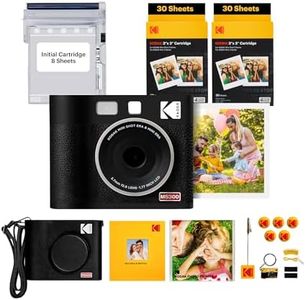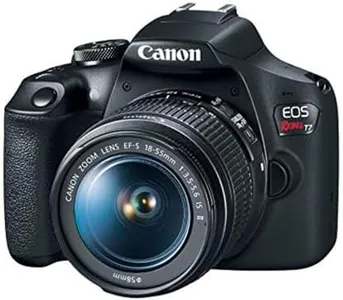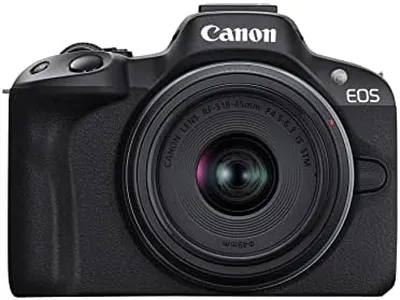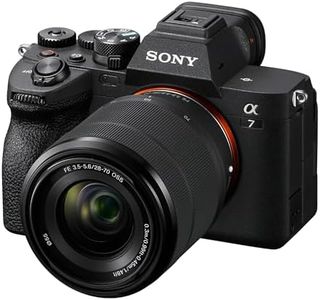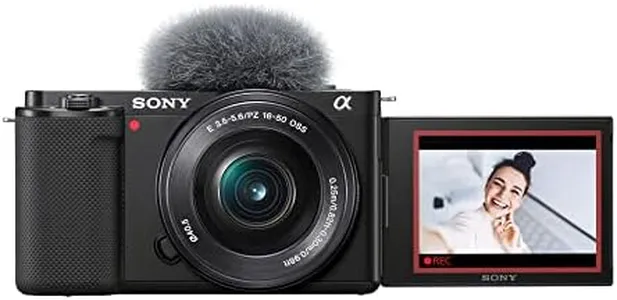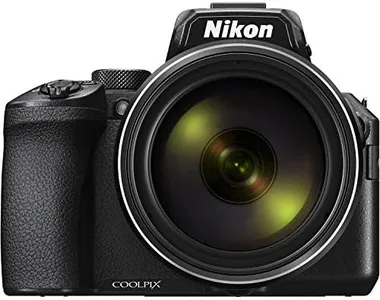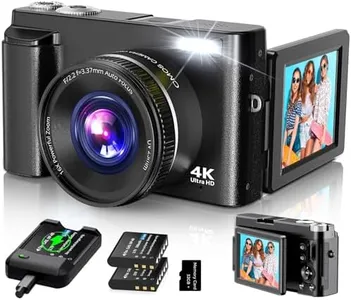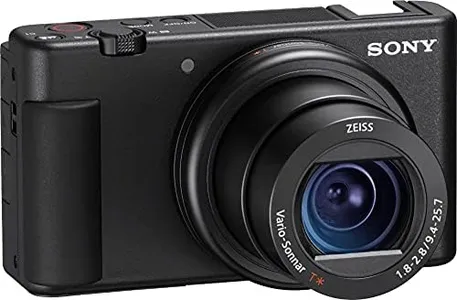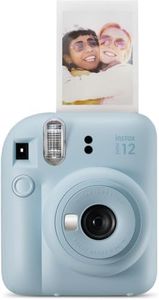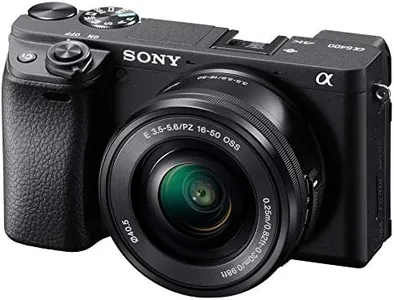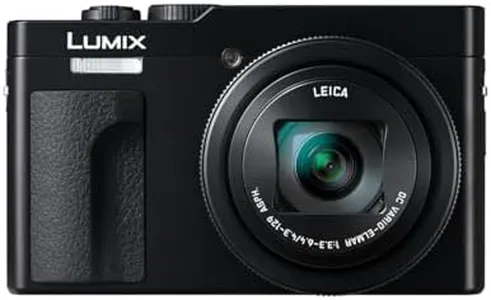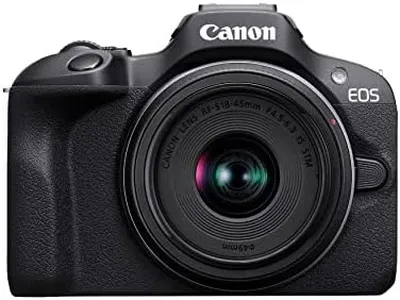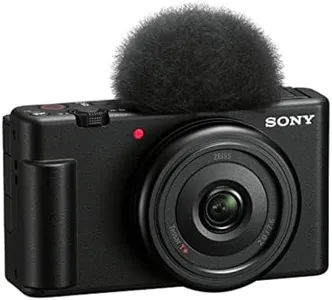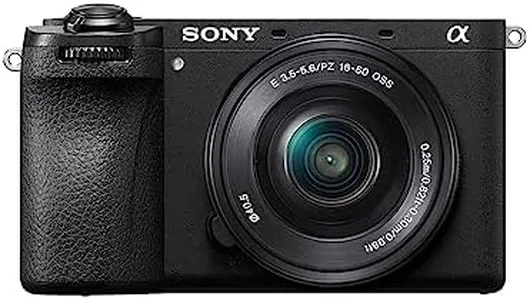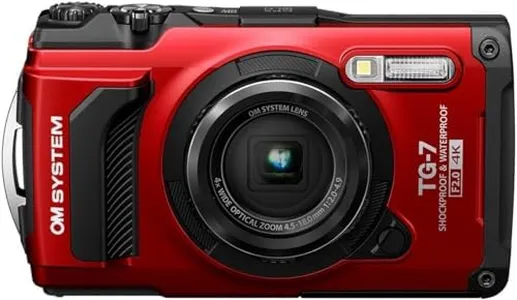10 Best Cameras for Beginners 2025 in the United States
Our technology thoroughly searches through the online shopping world, reviewing hundreds of sites. We then process and analyze this information, updating in real-time to bring you the latest top-rated products. This way, you always get the best and most current options available.

Our Top Picks
Winner
Canon EOS Rebel T7 DSLR Camera with 18-55mm Lens | Built-in Wi-Fi | 24.1 MP CMOS Sensor | DIGIC 4+ Image Processor and Full HD Videos
Most important from
8076 reviews
The Canon EOS Rebel T7 is a great option for beginners looking to dive into photography. With a 24.1 MP CMOS sensor, it captures detailed images and performs well in various lighting conditions due to its ISO range of 100-6400 (expandable to 12800). The camera’s 18-55mm lens is versatile, allowing for different types of photography, from landscapes to portraits, and the optical viewfinder provides a clear and direct view of your shot.
One of the notable strengths of the T7 is its user-friendly interface and ease of use, making it accessible for newcomers. The built-in Wi-Fi and NFC technology also allow for easy sharing of photos and remote control through a smartphone, which is a nice touch for those who enjoy connecting with friends or family online.
The autofocus system, featuring 9 points, is decent for beginners, though it may struggle in fast-moving situations compared to more advanced models. Battery life is respectable, with the ability to take around 500 photos on a single charge, making it suitable for day trips or events. The camera has a few drawbacks. The video capabilities are limited to Full HD (1080p) at 30 fps, which might be restrictive for users looking for high-quality video recording. Additionally, the continuous shooting speed of 3 fps may not satisfy those interested in capturing fast action shots. The optical viewfinder has a 95% coverage, which means some parts of your shot may be clipped, and it lacks advanced features like touchscreen controls and weather resistance.
The Canon EOS Rebel T7 is a solid choice for beginners who want an easy-to-use camera with good image quality and essential features. It may not cater to more advanced photographers seeking higher video quality or rapid shooting, but it provides a great starting point for those new to the world of DSLR photography.
Most important from
8076 reviews
Canon EOS R50 Mirrorless Camera RF-S18-45mm F4.5-6.3 is STM Lens Kit, 24.2 Megapixel CMOS (APS-C) Sensor, 4K Video, Hybrid Camera, Photo and Video, Vlogging, Content Creator, RF Mount, Black
Most important from
1455 reviews
The Canon EOS R50 Mirrorless Camera with RF-S18-45mm F4.5-6.3 IS STM Lens is a solid choice for beginners looking to dive into photography and videography. With a 24.2 Megapixel CMOS (APS-C) sensor, this camera ensures high-quality images with great detail. Its DIGIC X processor aids in producing clear and vibrant photos, even in challenging lighting conditions thanks to its advanced low-light performance features.
The Dual Pixel CMOS AF II system provides reliable autofocus with 651 AF zones, making it easy to capture sharp images of people, animals, and objects. This is particularly useful for beginners who may struggle with manual focusing. The high-speed continuous shooting capabilities (up to 12 fps with the Electronic First Curtain and 15 fps with the electronic shutter) are also great for capturing fast-moving subjects.
For video enthusiasts, the EOS R50 offers impressive 4K video recording at up to 30 fps and Full-HD recording at up to 120 fps. The vari-angle touchscreen makes it easy to shoot from different angles, which is helpful for vlogging and creative photography. The camera's built-in Bluetooth and Wi-Fi capabilities allow for easy file transfer and remote control via the Canon Camera Connect app. While the camera is packed with useful features, there are a few drawbacks. The lens kit includes a telephoto lens with a maximum aperture of f/4.5, which may limit low-light performance compared to lenses with wider apertures. Additionally, the camera's battery life might require carrying a spare battery for longer shooting sessions. Despite these minor limitations, the Canon EOS R50 is a user-friendly and versatile camera that is particularly well-suited for beginners who want to explore both photography and videography.
Most important from
1455 reviews
Sony Alpha 7 IV Full-frame Mirrorless Interchangeable Lens Camera with 28-70mm Zoom Lens Kit
Most important from
1025 reviews
The Sony Alpha 7 IV is a powerful full-frame mirrorless camera offering a high-resolution 33MP sensor that captures detailed, sharp images—great if you want image quality that can grow with your skills. Its sensor size and advanced BIONZ XR processor help produce excellent color and low-light performance. The included 28-70mm lens is versatile for everyday shooting, though beginners might later want to explore other lenses for more creative control.
Autofocus is a strong point, with 759 hybrid focus points and real-time Eye AF, making it easier for newcomers to get sharp photos of people or moving subjects without struggle. The camera also supports various focus modes and manual options, which might feel overwhelming at first but offer room to learn. Video features are impressive, supporting up to 4K at 60 frames per second with good color depth, making it suitable for beginner videographers who want quality footage. The 5-axis image stabilization helps keep shots steady.
Battery life is quite good, supporting long shooting sessions, and connectivity options like Wi-Fi, Bluetooth, USB, and HDMI allow easy sharing and remote control, useful for learning and sharing your work. The camera is somewhat heavy for beginners and carries professional-level complexity that might require time to fully understand. The touchscreen is tilting but not fully articulating, which might limit flexibility when shooting from tricky angles. This camera suits beginners serious about photography and video who are ready to invest time learning. It offers excellent image quality, fast and reliable autofocus, and versatile video options but comes with a learning curve and a higher price point compared to simpler entry-level models.
Most important from
1025 reviews
Buying Guide for the Best Cameras for Beginners
Choosing a camera as a beginner should be an exciting journey focused on understanding your needs and learning the basics of photography. Rather than seeking the most advanced or professional option, it's best to look for something user-friendly that matches the types of photos you want to take. Key features and specifications matter, but their importance depends on how you intend to use your camera—whether that's capturing family events, landscapes, travel memories, or experimenting with creative photography.FAQ
Most Popular Categories Right Now
